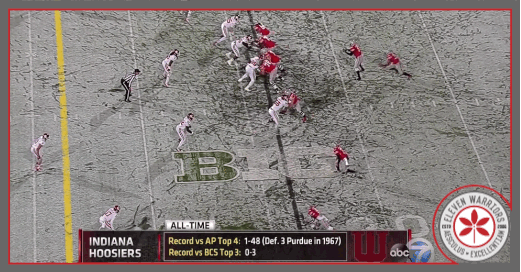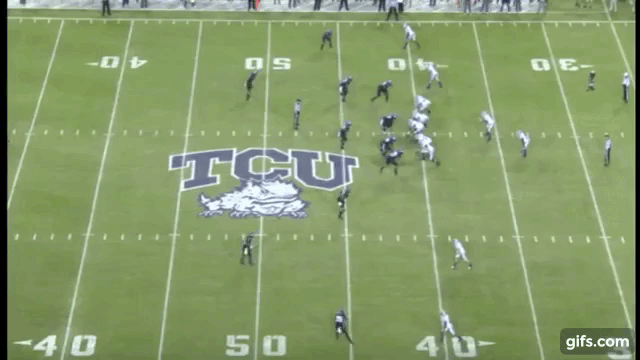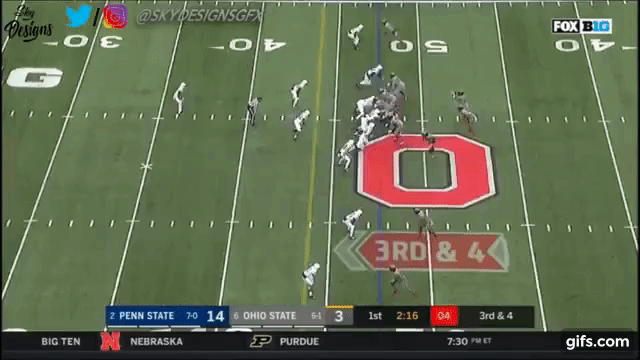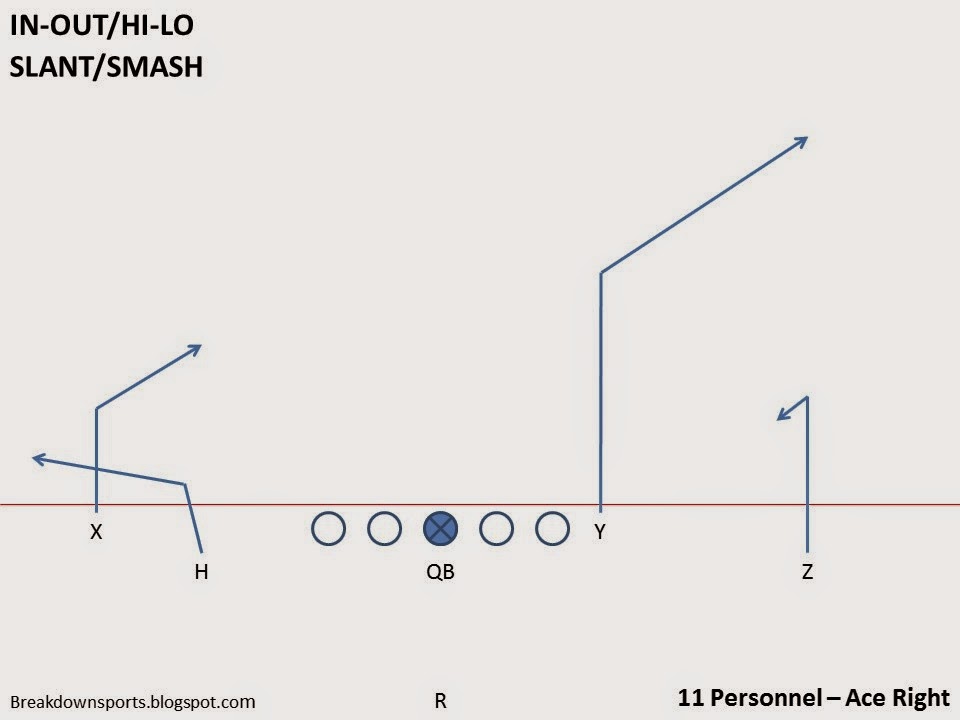Football Fundamentals: RPO Pass Concepts Behind the LOS
I previously set the foundation for "read" offenses. In this post, I want to build on that foundation to give a feel for the pass concepts that can be tagged onto various run schemes. There are a few different ways to break up this post to make it manageable, and the way I decided was to first look at the pass options that result in throws behind the LOS. In this case, illegal man down field doesn't come into play at the college level, so getting more than 3 yards down field isn't a concern.
Bubble
The earliest form of true RPO. With this concept, your generally looking to read an apex defender. If he crashes after the backside of the run, or adds himself to the run late, you can gain leverage to the outside of the defense.
In this case, it is a single read. The apex defender works inside, and OSU throws the bubble.
Flare
This is the same idea as the bubble, but originates from the backfield. Flare/swing doesn't get quite as far outside as fast, but it has added depth and can attack laterally faster (because the receiver isn't running into the sideline).
Note that this can be run with two RBs or a FB and RB.
Tunnel
Particularly against teams that like to crash LBs but still maintain outside leverage on the outside, this can form a natural tunnel that can be taken advantage of.
Here's a frontside tunnel (smoke) screen. Notice that this is attached to Power O back to the RB's alignment (in contrast to the diagram above, which is Power O away from alignment).
And here it is to the backside of the run
Now RPO
This will look a bit like the Tunnel, but the WR is not working back to the ball. Instead, he opens up and the other receivers to his side fan out and block the most dangerous
Slide/Bench
Another example of something like the bubble coming from inside the box. In this case, bench will initially look like a backside block before leaking out into the flat. "Slide" will initially look like split zone before leaking out to the flat.
This is another example of how a FB can be utilized in the RPO game. You can run offset pistol, split the FB, and leak into the flat.
Here's slide RPO
And here is Bench/Flat RPO
Bubble
The earliest form of true RPO. With this concept, your generally looking to read an apex defender. If he crashes after the backside of the run, or adds himself to the run late, you can gain leverage to the outside of the defense.
In this case, it is a single read. The apex defender works inside, and OSU throws the bubble.
 |
| Eleven Warriors |
Here it is if you want a true triple option look. Note that this is behind the LOS, so even if it develops late, at the college level, blockers can get downfield without threat of illegal man downfield.
Flare
This is the same idea as the bubble, but originates from the backfield. Flare/swing doesn't get quite as far outside as fast, but it has added depth and can attack laterally faster (because the receiver isn't running into the sideline).
Note that this can be run with two RBs or a FB and RB.
Tunnel
Particularly against teams that like to crash LBs but still maintain outside leverage on the outside, this can form a natural tunnel that can be taken advantage of.
Here's a frontside tunnel (smoke) screen. Notice that this is attached to Power O back to the RB's alignment (in contrast to the diagram above, which is Power O away from alignment).
 |
| Husker Chalk Talk |
Now RPO
This will look a bit like the Tunnel, but the WR is not working back to the ball. Instead, he opens up and the other receivers to his side fan out and block the most dangerous
Slide/Bench
Another example of something like the bubble coming from inside the box. In this case, bench will initially look like a backside block before leaking out into the flat. "Slide" will initially look like split zone before leaking out to the flat.
This is another example of how a FB can be utilized in the RPO game. You can run offset pistol, split the FB, and leak into the flat.
Here's slide RPO
2x2 condensed formation by PSU. Inside zone + slide screen #RPO. DE crashes on RB so QB pulls and throws the slide screen to the H Back for a nice gain on 1st down pic.twitter.com/ie5Bjqu6y4— icoachtowin (@1coachtow1n) July 23, 2018
And here is Bench/Flat RPO
Next we're going to look at the quick routes that are often attached to RPO.
Etc
One of the things to keep in mind when calling a particular route is the spacing on the field for the concept. For instance, if you are on a hashmark, you may want to avoid running a bubble into the boundary. A "Bench" RPO may work better to the field than to the boundary, where a "Slide" RPO may give better timing/spacing. So keep in mind not just the opponent coverage and how they defend certain runs, but also the spacing on the field.
Etc
One of the things to keep in mind when calling a particular route is the spacing on the field for the concept. For instance, if you are on a hashmark, you may want to avoid running a bubble into the boundary. A "Bench" RPO may work better to the field than to the boundary, where a "Slide" RPO may give better timing/spacing. So keep in mind not just the opponent coverage and how they defend certain runs, but also the spacing on the field.













Mvinditemp-woSan Jose Adrian Peterson https://www.lekohwellness.com/profile/pledgecariseeugenia/profile
ReplyDeletelecpopokkso